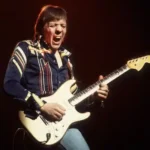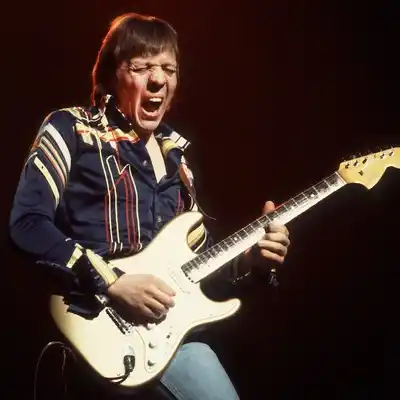
Robin Trower – The Life and Guitars
Robin Trower is a legend in the world of blues and rock. From his early days with Procol Harum to his successful solo career, Trower has remained an influential force in music for over five decades.
In this post, we explore the life of Robin Trower, his guitars, and the equipment that has shaped his unmistakable sound.
Table of Contents
Early Life
Robin Leonard Trower was born on March 9, 1945, in Catford, London. He grew up in a musical family, and his love for the guitar began at a young age. He was influenced by iconic artists such as B.B. King, Albert King, and Muddy Waters.
Trower’s professional career started in the mid-60s when he joined the R&B group The Paramounts. However, it was his tenure with the British rock band Procol Harum that truly launched his career.
Procol Harum
Trower joined Procol Harum in 1967, shortly after their hit single “A Whiter Shade of Pale” skyrocketed them to fame.
As the band’s guitarist, he contributed to their unique blend of progressive rock, blues, and classical music.
Trower played on several of Procol Harum’s classic albums, including “Shine on Brightly,” “A Salty Dog,” and “Broken Barricades.”
His time with the band helped shape his playing style and laid the foundation for his future solo work.
Solo Career
After leaving Procol Harum in 1971, Trower ventured on a solo career, quickly establishing himself as a force to be reckoned with.
His debut album, “Twice Removed from Yesterday,” was released in 1973, followed by the groundbreaking “Bridge of Sighs” in 1974. This album, featuring classics like “Too Rolling Stoned” and “Day of the Eagle,” showcased Trower’s fluid, emotive playing style.
Throughout his career, Trower has released over 20 solo albums. His most recent release, “United State of Mind” (2020), is a collaboration with singer-songwriter Maxi Priest and producer Livingstone Brown.
Collaborations
Throughout his career, Robin Trower has collaborated with various artists. One of his most notable collaborations was with legendary bassist and singer Jack Bruce, formerly of Cream.
Together, they released three albums – “B.L.T.” (1981), “Truce” (1982), and “Seven Moons” (2008) – which blended Trower’s unmistakable guitar work with Bruce’s powerful vocals and bass playing.
Another noteworthy collaboration is Trower’s work with Bryan Ferry, the former frontman of Roxy Music. Trower played guitar on Ferry’s 1993 album “Taxi,” lending his signature sound to the album’s blues-infused tracks.
Guitars and Equipment
Robin Trower’s primary guitar has always been a Fender Stratocaster, typically fitted with a rosewood fretboard.
Some of his notable Stratocasters include a 1965 model with a custom finish and a signature model released by Fender in 2015.
Trower is also known for his use of effects, particularly the Uni-Vibe, which emulates the sound of a rotating speaker cabinet. This effect has become synonymous with his signature sound, as heard on tracks like “Bridge of Sighs” and “Daydream.”
In addition to the Uni-Vibe, Trower has used various other effects, such as the Fulltone OCD Overdrive, the Boss CE-2 Chorus, and the Jim Dunlop Cry Baby Wah pedal.
As for amplifiers, Trower has predominantly relied on Marshall amps throughout his career, particularly the JTM45 and 100-watt Super Lead models. These amps provide the warm, rich tones that characterize his sound.
In recent years, he has also used custom-built amps by Hi-Tone, which are designed to replicate the classic Marshall tones while offering increased headroom and versatility.
Trower’s approach to his guitar rig is simple, yet effective. He relies on a few key pieces of equipment that are integral to his tone, focusing on achieving an expressive and emotive sound.
Legacy
Robin Trower’s extraordinary career has spanned over five decades. From his early days with Procol Harum to his enduring solo career, Trower has left an indelible mark on the world of music.
His fluid, emotive playing style has influenced countless guitarists across various genres, including blues, rock, and even metal. Artists such as Joe Bonamassa, Eric Gales, and Kenny Wayne Shepherd have cited Trower as a significant influence on their playing.
